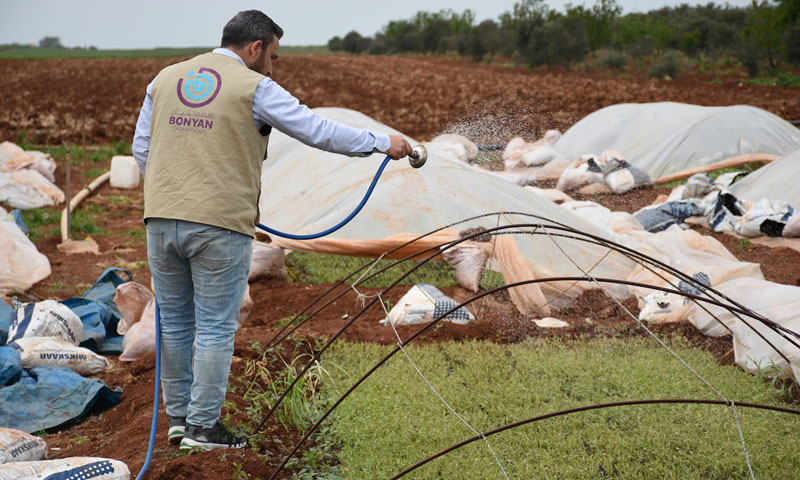Enab Baladi – Aleppo countryside
Farmers in Syria suffer from a gap left by agricultural directorates which used to supply them with seed and pesticides, prompting local NGOs to try and bridge this gap.
Earlier this year, the organization Bonyan launched a project titled “Crops of My Country” to support farmers north of Aleppo. They provide assistance, training and supervision to 1,370 farmers in the towns and villages of Aleppo’s northern countryside.
The project, which will continue until next July, covers the areas of al-Bab, Qabasin, Bza’a, Marea, Azaz and Akhtarin, in addition to the nearly 65 towns and villages that administratively fall within these areas.
Bonyan is an independent, non-governmental and non-profit organization concerned with Syrian affairs. It was established in 2004 and began operating in Aleppo in northern Syria, and was later licensed in Turkey in 2014.
Methods of Support
The organization provides seed for spring and summer vegetable crops, as well as fertilizers and pesticides, and simple agricultural equipment. They also provide training, supervision and consultations by agriculture experts, said the project’s director within Syria, Yahya Fattal, to Enab Baladi.
The beneficiary selection mechanism relies on identifying households that own lands close to their homes. The land must have an area of no less than one dunum, have access to irrigation water, and the household must not receive any similar support from any other organization during the year. The monthly income of beneficiary households must also not exceed SYP 50,000 per month.
Persisting Needs
The project manager said that the motivation behind its launch was to enhance farmers’ livelihoods, support the production of agricultural crops, and improve the food security of newly displaced and vulnerable farming families, as well as the host farming community, in northern Aleppo.
The project was launched by signing memorandums of understanding with the target local councils in early 2019, is concluded at the start of this year’s crop harvesting season.
According to the United Nations Food and Agriculture Organization (FAO), 6.5 million people are food insecure in Syria, and 2.5 million people are in danger of losing food security.
FAO attributed the causes of food insecurity primarily to displacement, with 6.2 million people in Syria being internally displaced due to the conflict since 2011.
Last year, Syria suffered its worst drought in 30 years, as well as unseasonable and heavy rains which caused flooding and exacerbated human suffering, and also contributed to a sharp decline in grain production.
Agriculture is the primary source of food for more than half of Syria’s population, and it accounts for 25% to 30% of GDP.











